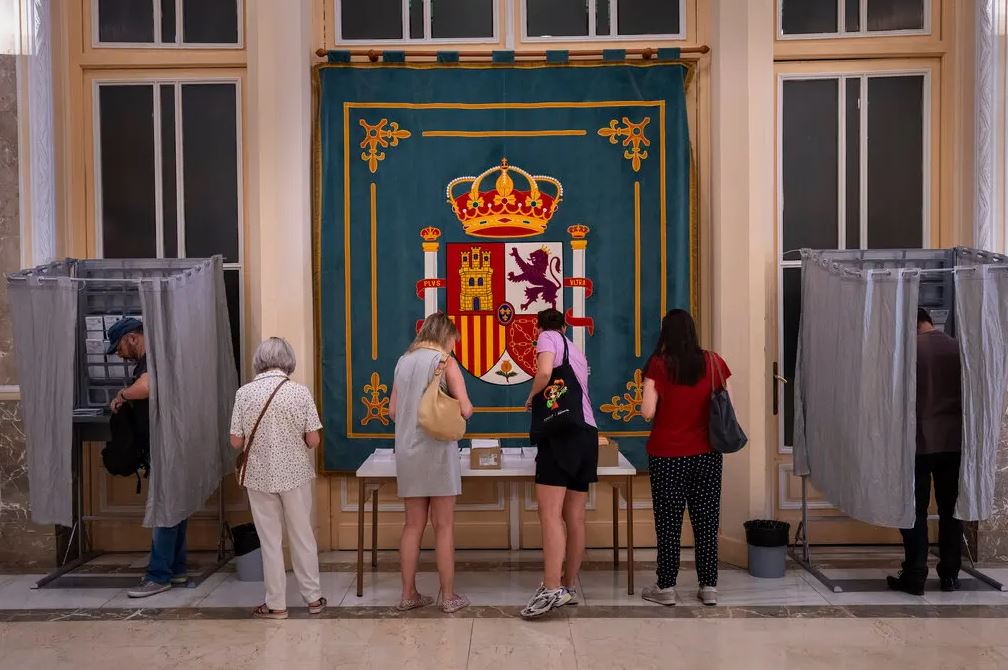After national elections on Sunday, no party in Spain had enough support to form a government, throwing the country into political uncertainty and setting the stage for weeks of horse trading or maybe a fresh election later this year.
The majority of votes fell within a narrow center-right to center-left spectrum. However, neither Prime Minister Pedro Sánchez’s Socialist Party nor his conservative opponents earned a majority of the vote in the 350-seat Parliament.
Although the conservatives did well, the hard-right Vox party that they would have worked with to create a government saw their support plummet as Spaniards rejected radical groups.
Since the breakdown of Spain’s two-party system about a decade ago, the resulting inconclusive election and political mess have become all too familiar to Spaniards. It felt like it would put Spain in a political limbo just as it was preparing to take on Russia’s actions in Ukraine while holding the rotating chair of the European Council.
With almost all votes counted, the conservative Popular Party led the Socialist Party by 12 seats in the legislature. However, they had planned to secure an outright majority in the legislative body and rule without Vox, which is seen as dangerous, anathema to Spain’s moderate ideals, and antiquated by many of the party’s own leaders.
Spain’s political climate is nothing new. Ten months of 2016 were spent in a state of political uncertainty as the nation lurched from one election to the next. In 2018, however, Mr. Sánchez used parliamentary manoeuvring to remove the conservative prime minister and seize power. After many more elections, Mr. Sánchez was able to form a minority administration with the help of the extreme left and several smaller independence groups in Parliament.
Mr. Sánchez, a political survivor of the first order, has surprised everyone once again by expanding his party’s parliamentary seats and securing enough backing from his left-wing partners to temporarily prevent the creation of a conservative administration.
Fears that Mr. Sánchez’s conservative opponents might join forces with Vox, the first hard-right party to enter the government in Spain in over half a century since the dictatorship of Gen. Francisco Franco, were stoked by Mr. Sánchez and his left-wing supporters in the weeks running up to the election.
Many Spaniards were taken aback by the idea of Vox sharing power in government, and the news sent shockwaves across the European Union and its last liberal strongholds. Many people had assumed that Spain had been protected from political extremism since the end of the Franco dictatorship in the 1970s.
Liberals said that if Vox were to gain power in Spain, it would be a worrying watershed moment and more evidence of the right’s ascent throughout Europe. Instead, Vox plummeted, perhaps bringing the Popular Party’s electoral prospects down with it.
Analysts say that voters in Spain wanted a compromise between the two extremes of the political spectrum. They predicted that a fresh election will further reinforce that tendency, making Vox even less influential than before. The Popular Party wants to win back their support and get enough members to form a government on its own.
Even though surveys indicated they were well behind, in the last days of the campaign, the Socialists and the far-left umbrella party Sumar exhibited confidence about the potential of turning things around. Billboards around Spain contrasted black-and-white images of the conservative leaders with colour portraits of Mr. Sánchez, with the former stating “Forward” and the latter “Backward.”
When campaigning against Mr. Sánchez, the Popular Party focused less on substantive initiatives. The conservatives and their hard-right allies ran a campaign that was highly critical of Mr. Sánchez and his “Sanchismo” style of government, arguing that voters couldn’t put their faith in him because he reneged on campaign promises, formed coalitions with the far left, and made deals that benefited his own political survival at the expense of the country.
Still, in recent years, Spain stood out as a beacon for liberals. As president, Mr. Sánchez successfully lowered inflation, soothed tensions with Catalan separatists, and boosted economic growth, pensions, and the minimum wage.
Many people were angered by Mr. Sánchez’s decision to work with separatists and far-left groups. The whole campaign focused on the questionable connections of the major parties, with Mr. Sánchez and his far-left ally warning against the fanaticism of Vox.
Despite widespread concern about extremism, the majority of Spanish voters supported a moderate candidate. Many Spanish citizens are still traumatised by the dictatorship and the decades of terrorism that resulted from territorial conflicts.
Santiago Abascal, the head of Vox, left the Popular Party in 2013 due to a slush money controversy. Vox’s early antics included wrapping the southern point of the British-controlled territory of Gibraltar with a Spanish flag.
In these other timelines, Muslims rule southern Spain and convert the Cathedral of Cordoba into a mosque. Mr. Abascal leads a gang of soldiers on horseback to reconquer Europe in another movie set to the music of Lord of the Rings, a cultural touchstone for Europe’s emerging far right.

